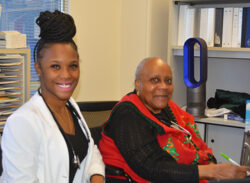Nurse Practitioner Reveals a legacy of Pediatrics at Authority Health


By Dennis Archambault
When E’Liza Scott, R.N., was studying to be a nurse practitioner, she searched for a preceptor for her Pediatrics internship. Her sister, an obstetrics nurse at Sinai-Grace Hospital, suggested Dr. Anne Mare’ Ice. Dr. Ice, a prominent Detroit pediatrician, had been screening newborns at the hospital. She was also the pediatrician for both sisters when they were children.
Scott remembered Dr. Ice as her role model. “It was amazing, for a little girl to have a pediatrician who looked like me. To see this Black lady and say, ‘Oh, my goodness, that could be me!’”
While a medical career was only as momentary consideration for Scott, she settled into nursing and eventually became a nurse practitioner, recently joining the staff at Authority Health. Before she could graduate, however, she needed one final internship in Pediatrics.
“One of the hardest things about NP (nurse practitioner) school is finding a preceptor,” she says. “It’s one of the challenges nationally. There aren’t many nurse practitioners to meet the demand of the students… I had just moved back to Detroit, and this was my last rotation. I thought I was going to have to put graduation off for an entire semester. I just could not find a preceptor.”
Her sister suggested that Dr. Ice might be willing to be her preceptor, but Scott had doubts. The rotation would have to begin within four weeks – hardly enough time to meet with a busy pediatrician and get the required paperwork completed. But Dr. Ice responded affirmatively. “I think it was God who got us aligned,” Scott said. “By this time, I hadn’t seen Dr. Ice in years. After all these years, Dr. Ice remembered my name.”
The internship with Dr. Ice affirmed Scott’s passion for Pediatrics. “Training under her was everything,” Scott said. “Dr. Ice is very specific in her care – really, patient-centered care. Dr. Ice taught me my best assessment skills and medical interviewing. I don’t think people realize how much you learn about your patients before you touch them. Interviewing is so important. If you know how to ask the right questions you can find out so much about their history. Sometimes it can be their third visit before finding out about something. If you had known the correct questions to ask, you could figure it.”
After completing her training and graduation, Scott was hired to work in a local federally qualified health center. However, her passion for Pediatrics lingered. Earlier in the year, she contacted Dr. Ice, asking if there were any opportunities with Authority Health. However, a few months later, she was contacted by Dr. Ice. A position had become available.
“It was meant to be,” Scott said. “She was my pediatrician, she was my children’s’ pediatrician, she provided my preceptorship, and now I’m here. I really feel at home here.”
While Scott was struck by the providential nature of the internship, Dr. Ice broke into a wise grin. “It doesn’t seem so unusual to me because the same thing happened to me. The pediatrician that I went to as child became my mentor.” Her mentor was Dr. Natalia Tanner, the second Black pediatrician in Detroit, and the first female Black pediatrician. When Dr. Ice completed her education and training, she returned to Detroit to join Dr. Tanner’s practice.
“Dr. Tanner was a great teacher. She was a clinical professor at Wayne State. She got me on that track. I became a clinical professor at Wayne State as well.”
While Scott performs a similar function as a physician in assessing, diagnosing, and treating patients, she says she draws on her experience as a nurse for active listening and compassion.
“I’m right there, point of care, doing everything with the patients, spending a lot of time with the patients, being able to have conversations, being able to see them as not just a patient but who they are as a person,” she says. “As a physician or nurse practitioner, we don’t have that time. It’s quick. We’re in and out… I definitely miss it. That’s why I’ve tried to incorporate it (in her practice). When I talk to patients, whether it’s adult patients or my pediatric patients and parents, before we get to all the medical stuff, I just relate to them as a person. I ask, ‘Why are you here?’ I really believe in treating my patients in a very holistic manner. In my opinion that’s the only way you can treat a patient effectively. It’s not just their medical diagnosis. If you don’t understand who they are as a person, their background, you can’t effectively treat them. It happens very quickly, but I really try to relate to them as a person. What is their story? Why are they behaving in this way?”
The patient that Scott treats as a pediatric nurse clinician is really two people – the child or adolescent and their parent. “A lot of time, we’re meeting these patients at their worst,” Scott says. “We have well-child visits, but a lot of them come in because they’re sick or hurting. I’m meeting parents who are tired, exhausted, who may be frustrated because they have a child whose behavior is outrageous. They don’t know what to do. They’ve been sick for a long time, and they’ve been to all these specialists who can’t figure it out. In treating these patients, I have to be very cognizant of and relate to the parents – those are two different personalities that I’m dealing with. I also have to realize that the parent understands this child way better than I do. Yes, I’m a medical professional and have education, but I have to also trust and listen to the parent and what they’re telling me… and include them in the care.”
Parents, in general, are very stressed today, Scott says. The provider often has to demonstrate understanding and empathy.
“I try to reassure them that in 2022, just making it from one day to the next is a blessing, it’s a struggle. You need to pat yourself on the back… Letting them know that me personally, that those of us at Authority Health genuinely care and that we do understand that you’re not perfect. Reassurance and encouragement go a long way.
“A lot of time they’ll think they’re failing as parents; they’re not doing well in school – that’s my fault… They may be behind on their vaccine schedule. We get it. We understand. Let’s get on a plan together. We’re in this together. We’re not judging you. Our goal is for your little one to be the best they can be. I’m sure that’s yours as well. Reassuring them and setting realistic goals with parents is key.”
In her interpretation of patient-centered care, Scott takes a pragmatic approach. What may work with one parent may not work with another. A stay-at-home parent may have greater potential for preparing routine healthy meals and monitoring their child’s physical activity than one struggling to maintain a demanding job, possibly two. Depending on the circumstances, families may need to eat fast food. It’s important, she says, to make sure “expectations are realistic, providing as many resources to these parents as possible to lighten their load and letting them know that it takes a village and that we are part of that village here.”
The psycho/social dynamic in Pediatric care is much more difficult than it would seem, especially for patients coming from family experiences that involve the effects of poverty and trauma. It requires attention to the needs of the patient and family through a comprehensive assessment of social determinants of health. This is done prior to the patient meeting with Scott.
She shares a story of a 17-year-old girl who came with her mother. She seemed discouraged, depressed, and she was noticeably obese. Before Scott began her physical examination she asked her, “What’s going on?”
“She opened up to me and let me know that she has tried to kill herself before in the past and that she’s seen therapists but didn’t like the therapists she’s seen, and she feels that mom doesn’t really understand me. Mom tells me, “Just get it out of your head. Don’t claim that depression.” I asked her, ‘What kind of things do you like?’ She said, ‘I like music…and I like animals. Just talking to you has helped me feel better.’”
After a careful, empathetic exchange, they arrived at a plan for physical activity and healthier eating. Scott referred her to a psychotherapist and helped her connect with an animal shelter to adopt a rescue dog. “That would make me so happy,” the patient told Scott. “She had a smile on her face.”
It’s the little things that count, Scott says. And attention to these details will add considerable value to Scott’s effectiveness with Authority Health.
“It’s a pleasure having her here,” Dr. Ice says. “E’Liza is going to make a difference – she’s only been here a month. She’s going to bring patients into the office because they’ll like her. She’s very personable. They’ll want to come. They’ll tell their friends. The ones who are here will stay because she’s a person they can relate to.”
Just as Dr. Ice was.
Dennis Archambault is the Vice President of Public Affairs at Authority Health
